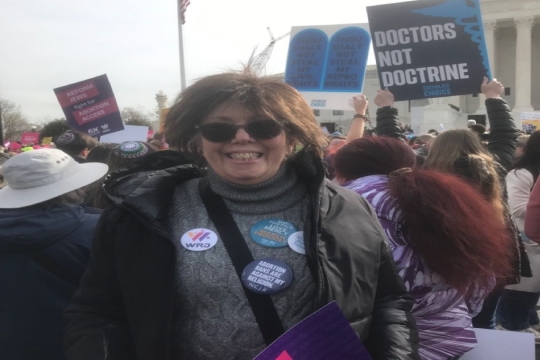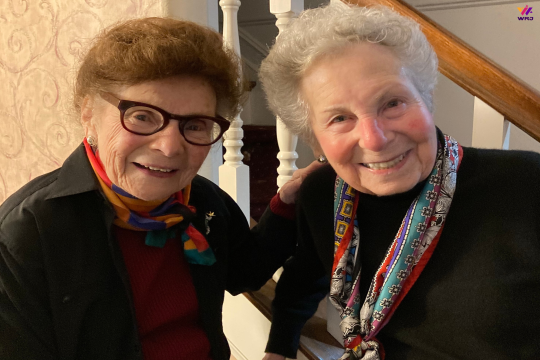
Women of Reform Judaism has a long tradition of advocating for social justice, including racial justice. WRJ’s ongoing commitment to fighting prejudice and racism is currently reflected in its partnership with the Religious Action Center of Reform Judaism (RAC) on the 2021 Racial Justice Campaign, which formally launched this past Wednesday. The purpose of this campaign is to address systemic racism by demanding policy change on both the state and federal levels.
To do this work effectively, the RAC put together two teams representing a demographically diverse, multi-racial cross-section of the Reform movement, bringing together different experiences and perspectives. Debra Goetz was appointed as the WRJ representative to the Leadership team, which oversees the campaign. Julia Weinstein was appointed to the Research Team as the WRJ representative. This team, of which Abby Fisher was also a member, would identify which key public policy issues to consider as the focus of the campaign.
The Leadership Team's goals include creating a common language to guide this work, connecting our internal work with our policy work, establishing partnerships with other allied groups, and ensuring that both the campaign's impact and progress are measurable. The Leadership Team began its work earlier this year, including meeting with the Research Team to discuss the potential issues on which they would focus.
The Research Team's goal was to engage with experts, advocacy groups, and nonprofits to identify issues for the campaign’s federal advocacy pillar and narrow down the potential 2021 issue campaigns to one or more that would be presented to the movement at two Town Halls. During January, February, and into March, this team held 18 meetings with representatives of various advocacy groups, including the Brennan Center for Justice, Faith in Action, the NAACP, the Sentencing Project, and United We Dream. The purpose of these meetings was to build relationships with allied groups and learn what issue campaigns, policies, or bills the groups planned to prioritize in 2021. We wanted to know, for example, whether a policy has the potential to transform our society to better reflect our Jewish values of justice, compassion, and wholeness.
We discovered that voting rights were the first priority mentioned in every meeting. It became clear that to address systemic racism, voting rights would have to be addressed.
At the end of the Research Team’s process, based on the campaign priorities, they narrowed the focus to two issues: Voting Rights and Democracy Reform (H.R. 1, the For the People Act and H.R. 4, The John Lewis Voting Rights Advancement Act) and Reparations for Black Americans (H.R. 40, the Commission to Study and Develop Reparation Proposals for African Americans Act).
Just before Pesach, these two issues were presented in detail at two Town Hall meetings, with approximately 900 Reform Jews attending between the two sessions. The participants were polled to determine which issue resonated most. (Selecting one issue as the focus does not mean our movement does not value the others, and work on other issues will also continue.)
While the Research Team's work has concluded, the work of the Leadership Team will continue with the implementation of the 2021 Racial Justice Campaign. It may come as no surprise that, despite the importance of studying reparations and the other issues examined by the Research Team, Freedom to Vote (which is what Voting Rights and Democracy Reform developed into) was selected as the issue for this campaign.
Within WRJ, we recognize that the Freedom to Vote fundamentally impacts every issue from health care to reparations and is a continuation of our participation in the 2020 Civic Engagement Campaign. This issue also fits with the resolutions that the WRJ legislative body recently adopted this year - Labor Issues Impacting Women in the 21st Century and Addressing a Legacy of Reproductive and Gender-Based Violence Against Black, Indigenous, and Women of Color in North America. It is also a path to implement the URJ’s 2019 Resolution on the Study and Development of Reparations for Slavery and Systemic Racism in the U.S.
The 2021 Racial Justice Campaign is the next step in WRJ’s long history in advocating for racial justice. Together with the RAC, our Reform movement partners, and other allied partners, we will fight to dismantle systemic racism and end voter suppression.
Debra Goetz is an attorney and currently serves on the WRJ board and the board of the WRJ Southwest District. She is the Sisterhood president of Temple Emanuel in McAllen, Texas.
Julia Weinstein is an attorney and a member of the Commission on Social Action of Reform Judaism. She has just concluded her term on the WRJ Executive Committee and is now a WRJ Chai Society member. She is a member of Wilshire Boulevard Temple in Los Angeles, CA.
Related Posts

Andrea Stillman: A WRJ Leadership Spotlight

